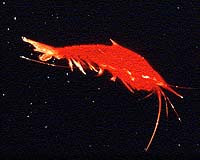| . |  |
. |
Nairobi (AFP) Oct 5, 2009 One of the world's most endangered primates, the greater bamboo lemur, a species endemic to Madagascar, has been found in an area where it was feared extinct, environmental organisations said Monday. The species, "prolemur simus", has been found at 11 sites in a swathe of forest in the east of the island. This finding opens "a new chapter for the species and for the places we can protect it by preserving the forest as the main problem is loss of habitat," Mahaoly Ravaloharimanitra, a research assistant at the Aspinall Foundation, told AFP. Illegal logging and slash-and-burn agriculture are among the practices that threaten the survival of this species. Primate specialists say that while this type of lemur was once found throughout this Indian Ocean island, now no more than 300 individuals are still in existence. As its common name suggests, prolemur simus feeds mainly on bamboo, which limits its habitat options. "They are very secretive, which makes it difficult to approach them and protect them. Most of the time we don't see the animal, just traces of food or droppings," Tovanahary Rasolofoharivelo from Conservation International told AFP. The greater bamboo lemur was thought to be extinct until it was rediscovered in the 1980s, the two associations said in a statement. Share This Article With Planet Earth
Related Links Darwin Today At TerraDaily.com
 Tourist faeces 'killed off rare Ayers Rock shrimp': report
Tourist faeces 'killed off rare Ayers Rock shrimp': reportSydney (AFP) Sept 29, 2009 Tourists may have killed off a rare species of shrimp by relieving themselves on Australia's iconic Uluru, or Ayers Rock, a report said on Tuesday. Biologist Brian Timms said his research had showed one species of small inland shrimp living in pools atop the monolith had become extinct while another had thrived. "The people going up the rock somehow have affected the animals which live ... read more |
|
| The content herein, unless otherwise known to be public domain, are Copyright 1995-2009 - SpaceDaily. AFP and UPI Wire Stories are copyright Agence France-Presse and United Press International. ESA Portal Reports are copyright European Space Agency. All NASA sourced material is public domain. Additional copyrights may apply in whole or part to other bona fide parties. Advertising does not imply endorsement,agreement or approval of any opinions, statements or information provided by SpaceDaily on any Web page published or hosted by SpaceDaily. Privacy Statement |